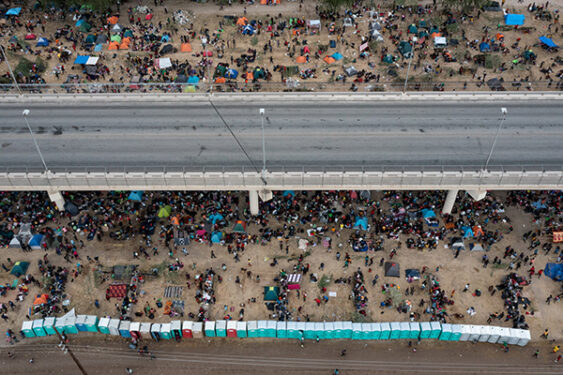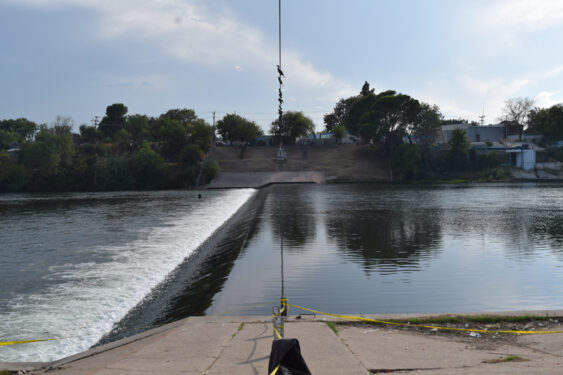DEL RIO, Texas — When assessing the recent border crisis that led to more than 10,000 migrants being let into the U.S., Father Jaime Paniagua of St. Joseph Catholic Church, asks a single question: Why?

Why, he wonders, were those migrants allowed in, when so many others go through the legal process?
[Related: With Thousands Of Migrants Now Dispersed, Del Rio, Texas Braces For ‘The Next Surge’]
Father Paniagua is from Mexico and in the U.S. on a religious visa. His parents, who live in Tamaulipas, Mexico, have tourist visas that would enable them to see him, but they haven’t been able to come across the border for more than a year because of COVID-19 restrictions.
“It’s a contradiction,” Father Paniagua said. “If you do things right, you cannot come, but then we have this influx of migrants coming illegally, and they’re admitted. It’s very hard to understand.”
The priest added that his personal opinion is that “it’s not right,” though he understands that there are “circumstances of emergency or misery in these other countries that oblige people to do something like this.” Father Paniagua said, however, that regardless of how someone enters the country, once they’re here, will help them in any way possible.
“For us, as a Church, we need to serve. We need to protect human dignity,” Father Paniagua said. “Through Catholic Charities or through a fund that we have that people have donated to help immigrants, we get them a bus ticket, an airplane ticket, give them some hotel nights, get them food, give them clothes, medicine, whatever is needed.”
Others in Del Rio fall on both sides of Father Paniagua’s stance.
In one part of Del Rio — with his yard practically up against the black, metal border fence — a man that would only disclose his last name, Riveras, said he was unbothered by the latest crisis. As an immigrant himself, who regularly goes back and forth across the border, he called the current migrants’ situation “sad.”
“It didn’t frustrate me at all,” he said. “I tried to help those guys out by bringing food and clothes over to [Ciudad Acuña, Mexico].”
Gilbert Maldonado, a Del Rio resident and parishioner at one of the city’s Catholic churches, has a different view. He called it “intense” to have 15,000 people underneath the International Bridge at one time, and he doesn’t agree with many of them getting a free pass into the country.
He said he knows a woman in Mexico who could not obtain a visa appointment for her daughter — to stay in the U.S. with her grandmother — until October 2022.
“That little girl is going through the process to get a visa, and she doesn’t get a free pass to come here,” Maldonado said.
He added that he knows “a lot of people that are doing it the right way” and “are upset that these people were just let in.”
Joe Frank Martinez, the sheriff of Val Verde County and a lifelong resident of Del Rio, has witnessed the tension rising in Del Rio over the border crisis all year. Martinez noted that, while the situation in recent weeks garnered national attention, illegal border crossings have been a steadily increasing problem.

He remembers that, back in February, some Del Rio citizens were asking, “when can we shoot?” And in one specific instance in September, a woman came out of her house and fired four gunshots in the air, saying in Spanish that “these individuals in my neighborhood, they’re not going to mess with me!”
“My concern is someone is going to kill one of these individuals for knocking on their doors or asking for a glass of water, asking for something to eat,” Martinez said.
Martinez, who is in his 13th year as the elected county sheriff, acknowledged there are also people who are afraid, especially in the neighborhoods beyond the end of the border fence; some migrants flock to that location in an effort to evade border authorities.
“It’s an easy walk around into these neighborhoods, so these people are concerned,” Martinez said. “Those people underneath the bridge in my opinion wanted to turn themselves in for an opportunity to seek asylum. The people that go around the fence areas out west, those are the people that don’t want to get caught.”
Martinez recognizes the anger and fear that many residents of Del Rio feel toward the situation, including the burden it places on the small rural city; it has limited infrastructure to respond to surges of migrants in a timely manner.
However, being on the front lines, he recognizes the crisis these migrants face as well. He recalled a recent encounter he had along the Rio Grande River with a mother and her 5-year-old son. She said their journey to the U.S. from Venezuela took four years.
“Her comment to me was, she would prefer for her and her son to drown under the river than stay in Venezuela and die,” Martinez said. “These people are desperate and determined and looking for a better way of life. I feel for them. Throw that [concern] in there also because they’re children of God, too.”

